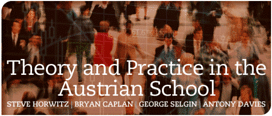I appreciate Steve’s gracious response. Rather than directly reply, I’d like to take this opportunity to ask Steve some hard questions in the friendliest possible way.
To keep the conversation on track, I implore Steve to bluntly share his own views—not discuss the range of answers that various Austrians, living and dead, might offer. At risk of sounding prickly, I regard any response containing phrases like, “Hayek would say…” as unresponsive.
My starting batch of questions for Steve:
1. What are some important, substantive economic claims that can be known a priori?
2. What are some important, substantive economic claims that can be logically derived from a priori knowledge plus a small number of uncontroversial empirical assumptions (e.g. the disutility of labor or the existence of money)?
3. Economists use multivariate statistics for a reason: to adjudicate between multiple competing hypotheses. Can you name an important, substantive empirical issue where Austrians have grappled with this conundrum? How convincing were the Austrians’ results?
4. What are some important, substantive mainstream empirical conclusions that most Austrians either (a) don’t know, or (b) don’t suitably appreciate? What’s going wrong—and what’s the solution?

